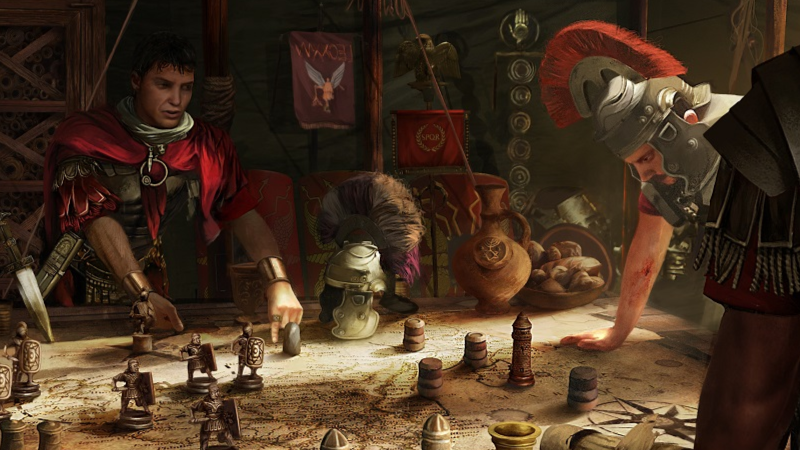Shrimp
Liturgist
- Joined
- Jun 7, 2019
- Messages
- 1,071
hmm...nuke all cat people
Nuke everyone, just to be sure none of them cats survive.
But the cat priestess in this game is cute tho...
hmm...nuke all cat people
Nuke everyone, just to be sure none of them cats survive.
But the cat priestess in this game is cute tho...
Remember to search the kitty map well, there is a good amulet you can keep.
Kurwa.




You have unspent skill points.Bro.
How hard could it be to haXor the text files to make choice choice 2 'throw them on a pyre with their men' and 3 'become literal camp followers'? Hell, the entire game could be transformed this way.At least the game doesn't force you to turn them into warriors, but I'd still rate this random overmap event as having an agenda.
















Hotfix - v1.1.4
1. Modified the encounter in the quest Ambiorix’s Warning:
2. Fixed an issue where characters who are hurt during the Rome Sweet Rome quest will still be injured after the 5 year jump at the start of the Message From Lucullus quest. They will now be healed.
- Fixed an issue with the encounter not completing if players manage to kill all the enemies during the encounter.
- Cativolcus now places a Rally banner at the start of the fight.
- A Charger and Arsonist have been added to Cativolcus’ team.
- Adjusted the level of the enemies in the encounter slightly.
- If you lose the encounter, all injuries will be cleared when you wake up later.
3. When using the Twitch extension, the nameplates for the characters will now be colored based on whether they are allies (green), enemies (red), or neutral (grey). The name plates will also fade out a bit if the character is defeated.
4. Fixed an issue with Afrorum legion not pathing correctly in the Gaul region.
5. Fixed an issue where Centurions could be hired for the Afrorum legion in Gaul when the Legion Afrorum was not available.
6. Fixed an issue where a barrel was blocking a ladder on the Mountain Village instance.
7. Improved game stability (crashes).
8. Fixed an issue where Deianeira was appearing in sections of Rome when she was not supposed to (based on story decisions).
9. Fixed a hex issue on Cliff Pass Overlook that could cause the player to get stuck if their own character happens to be standing on this hex when combat ends.
10. Fixed an issue where characters would “RAAAAAAAHHHHHH” every time enemies move from retargeting when using the Twitch extension.
11. Added some refund functionality to the Twitch extension:
a. You will be refunded if you try to apply a status effect when that effect is already applied.
b. You will be refunded when you try to heal a character at full health.










Dude probably got hit by a menhirI loved the part where the bad guy's whole plan is to lure you into Gaul so you can get killed, and then when there's a perfect opportunity to just stand by and do nothing, he saves you because... Because.
I did like literally two main story missions in Gaul act 3 and uninstalled. Pretty much felt the same.alright this has become terminally boring halfway through Egypt. the enemy AI cannot keep up with you at all once you master some class skill trees, even on Hard I'm ending every combat in turn 1 without taking a single point of damage and the conquest stuff is shallow and tedious. if they had cut that portion out and condensed the rest of the game I'd be happy to beat it but after 30 hours I don't ever want to touch this again
I'm fairly sure I'm almost done with Egypt and knowing that I'm only two thirds through the game is not doing it any favours. The game blew its load way too early and I feel like it simply doesn't have anything new to offer past the first campaign in Asia Minor.I did like literally two main story missions in Gaul act 3 and uninstalled. Pretty much felt the same.alright this has become terminally boring halfway through Egypt. the enemy AI cannot keep up with you at all once you master some class skill trees, even on Hard I'm ending every combat in turn 1 without taking a single point of damage and the conquest stuff is shallow and tedious. if they had cut that portion out and condensed the rest of the game I'd be happy to beat it but after 30 hours I don't ever want to touch this again
Quoting for truth, and because I was struggling to remember which Chappelle character he looked like.


Character on the right is hilarious. Look at those biceps. Look at that hand.





Really need a coomer rating.And she has an ugly face.
Cleopatra is a qt tho, both face and body.

What's with Roman history understanders here complaining that some liberalis are black, do you think Rome was based in Scandinavia or what?







